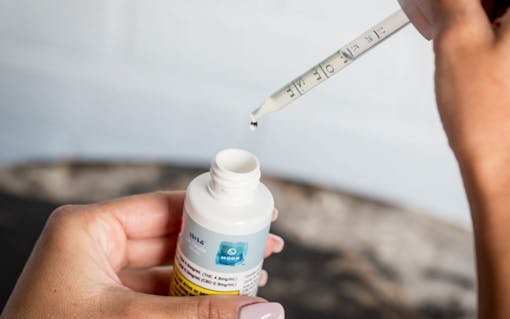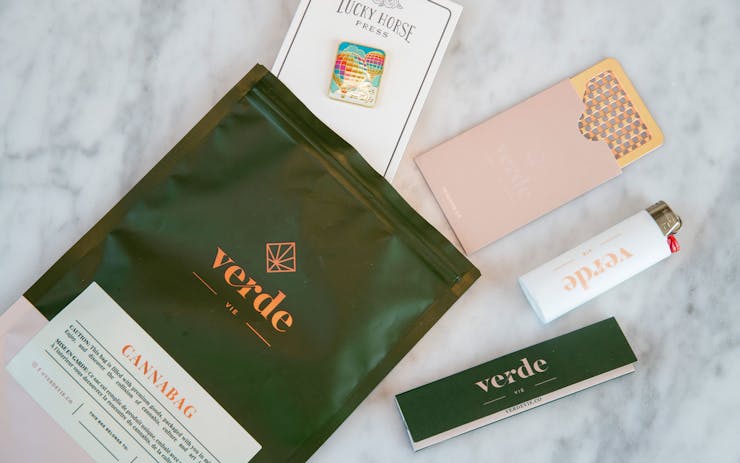Thanks to legalization, women who couldn’t see themselves reflected in the prohibition-era cannabis marketplace are opening up about their use, and the opportunity for brands to connect with them has never been greater.
But with the explosion of brands trying to cater to half the population, it’s tough to discern which are genuinely keen to engage with female-identifying consumers, and which are simply content to “pinkwash” products with the intent of cashing in.Join the Leafly Canada Community
Femme-Focused Brands
One of the first brands to speak to Canadian women, Van der Pop, was founded by April Pride after she realized her husband’s NFL-branded pipe didn’t exactly suit her taste. She began by creating a line of chic accessories but quickly realized that there was a bigger conversation to be had about women’s cannabis consumption.
Senior brand manager Lauren Pryor says femme-focused brands like Van der Pop are important for two reasons: Not only do they help to address the different effects that cannabis can have on the female body; they also work to dispel societal stigmas around cannabis consumption that prevent women from discussing their use.
But what sets Van der Pop apart? Pryor said it has to do with thought leadership and an emphasis on research, like Van der Pop’s recurring Women & Weed study.
In addition to offering a selection of feminine accessories, Pryor said Van der Pop aims to empower women with information. Take Dear Vandy, a cannabis-focused advice column, or Hot Box, which delves into cannabis and sex. It also sells two strains selected by Pride and her staff, currently available in Manitoba and Ontario.
While Van der Pop appeals to the established cannabis consumer, Irisa, a brand under the High Park Company umbrella, wants to connect with women who prioritize health and wellness, but who might “not be so willing to wave the flag of ‘cannabis consumer’,” according to spokesperson Berrin Noorata.
Femme-Forward Formulations
In an effort to offer canna-curious women and first-timers products that they could rely on, the team behind Irisa developed four low-dose oils that are “discrete and made for consumers to incorporate into their self-care routines.”
The line includes Sun, a high-CBD option; Earth, a balanced, slightly CBD-dominant oil; Moon, the line’s highest THC option; and Stars, a balanced oil with slightly more THC. Its most potent oil contains just five milligrams of THC per millilitre.

Photo by Jesse Milns for Leafly
“We’re big believers in micro-dosing and layering up dependence… we wanted to develop a product that women could trust and come back to regularly because they know what they are going to get,” said Noorata. She said the brand is also working to create community events for women across the country. So far, Irisa’s oils are only available in BC, Ontario, and Quebec.
Licensed-producer-backed brands have certainly caught women’s attention, but smaller, more entrepreneurial brands are making their mark on Canadian women, too.
Bespoke Accessories
When Emma Baron was hired to work at a medical cannabis clinic, she noticed that clients who were new to cannabis had a hard time finding the right accessories to use with their medicine. She and Dr. Carolina Landolt founded Milkweed, an accessories brand that brings one-of-a-kind, Canadian-made cannabis goods to market.
Baron works with artists and makers from across the country to co-design bespoke cannabis accessories that could pass as collectible art pieces. She doesn’t necessarily peg the brand as one that caters to women, but she recognizes that an inherent femininity comes through in its product offering simply because the collections are curated by women.
“We set out to make it genderless, and really the focus for us is a craft look—but I think just by nature of being a female entrepreneur in this space, it does have a sort of feminine touch.” Baron said Milkweed is also looking to work with a licensed producer to bring a line of topicals to market.
At Verde Vie, the focus is as much on creating well-designed products for a new generation of female consumers as it is about working to break down stigma.
Olivia Levy, a medical cannabis consumer with a law background, started the brand after becoming frustrated with hiding something that had dramatically improved her quality of life.
“It was a very big part of me that I couldn’t share with the world,” Levy said.
Taking inspiration from the bar cart, she asked herself why the same approach—one that normalizes consumption while allowing one to personalize their ‘stash—couldn’t be applied to cannabis.
“It’s about normalizing everyday objects, and creating beautiful, aesthetically pleasing items that we can view seamlessly without necessarily having to hide,” said Levy.
Verde Vie’s starter kit includes everything you might need to roll a joint, including rolling papers, lighters, and a grinder card. The brand also works with artists to create accessories like pipes, trays, and clothing.
Verde Vie’s sister site, Stay Cultivated, ties it all together. The educational, inspirational, and behind-the-scenes content all speaks to Verde Vie’s mission to “create a new kind of cannabis culture,” said Levy.
For Women by Women
At Eve, founder and CEO Melinda Rombouts is creating a new kind of corporate cannabis culture. She’s at the helm of a company staffed predominately by women. (Eve’s medical brand, Natural Med Co., was the first licensed producer in Canada founded by a woman.)
“We’re looking to the moms of the world, the working women of the world. We want to change the story of cannabis for them so that they’re more comfortable.”
Proud to hire women with grey market experience as the brand’s internal specialists, Rombouts said among other products in development, Eve plans to sell edibles once regulations are in place—including lines of vegan and gluten-free products.
“We’re looking to the moms of the world, the working women of the world,” said Rombouts. “We want to change the story of cannabis for them so that they’re more comfortable.”
Eve also dedicates time and resources to research, and is currently working with a partner to examine the way cannabis affects women’s health issues like endometriosis.
Since 2016, Rombouts has kept track of the uptick in women’s brands, and says that while females run “only a few,” the sense among women in the industry feels increasingly like one of camaraderie.
“Women will gravitate to any one of these women’s brands. We’re very supportive of each other, and I don’t think we see it as a competition.”
“We’re creating products that appeal to women, and as women ourselves, I think we have a good vibe on that… it’s about sensible products we might give to a friend, or our sick mother.”
Another company backing up its women-focused branding with female leadership is 48 North, where Alison Gordon and Jeannette VanderMarel act as co-CEOs. In June 2018, Gordon became the first woman to take a Canadian cannabis company public in Canada, before VanderMarel joined the team in December.
At 48 North, VanderMarel said the focus is on creating health and wellness products geared to adult women that are high-quality, consistent, and in some cases, organic.
“We’re creating products that appeal to women, and as women ourselves, I think we have a good vibe on that… we won’t be creating products with synthetic inputs or colours; it’s about sensible products we might give to a friend, or our sick mother,” she said.

Photos by Jesse Milns for Leafly
It’s the brand’s no-fear approach to cultivation that sets it apart not only from other brands, but from most other licensed producers: 48 North is currently awaiting approval from Health Canada to grow organic cannabis on a 100-acre outdoor farm, with the hopes of being the first company to provide Canadian women (and men, too) with a selection of more sustainable cannabis products.
“One of the things I think women and people in general really care about is the environment,” said VanderMarel. “I think [our farm] could really address the issue of supply, but also gives a large quantity of quality organic product that we think is important for the market.”
Whatever your thoughts on women’s cannabis brands, they provide women with an environment within which they can learn, while feeling safe to speak up, ask questions, and participate—but also one where they can see themselves as innovative founders and top-level executives (with, of course, an incredible array of more feminine products and accessories to choose from).





